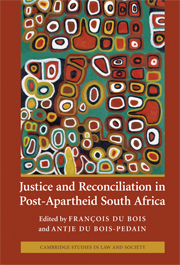Book contents
- Frontmatter
- Contents
- List of tables and figures
- List of contributors
- Acknowledgements
- List of abbreviations
- Introduction
- 1 Reconciliation as surrender: configurations of responsibility and memory
- 2 Radical forgiveness: transforming traumatic memory beyond Hannah Arendt
- 3 Communicating criminal and political responsibility in the TRC process
- 4 The contribution of criminal justice
- 5 Reparation and the forms of justice
- 6 Land restitution and reconciliation in South Africa
- 7 For justice and reconciliation to come: the TRC archive, big business and the demand for material reparations
- 8 Transition, forgiveness and citizenship: the TRC and the social construction of forgiveness
- 9 The evolving legitimacy of the South African Constitutional Court
- 10 Drawing the line: justice and the art of reconciliation
- 11 Post-conflict justice and the reconciliatory paradigm: the South African experience
- Index
- References
7 - For justice and reconciliation to come: the TRC archive, big business and the demand for material reparations
Published online by Cambridge University Press: 01 July 2009
- Frontmatter
- Contents
- List of tables and figures
- List of contributors
- Acknowledgements
- List of abbreviations
- Introduction
- 1 Reconciliation as surrender: configurations of responsibility and memory
- 2 Radical forgiveness: transforming traumatic memory beyond Hannah Arendt
- 3 Communicating criminal and political responsibility in the TRC process
- 4 The contribution of criminal justice
- 5 Reparation and the forms of justice
- 6 Land restitution and reconciliation in South Africa
- 7 For justice and reconciliation to come: the TRC archive, big business and the demand for material reparations
- 8 Transition, forgiveness and citizenship: the TRC and the social construction of forgiveness
- 9 The evolving legitimacy of the South African Constitutional Court
- 10 Drawing the line: justice and the art of reconciliation
- 11 Post-conflict justice and the reconciliatory paradigm: the South African experience
- Index
- References
Summary
INTRODUCTION
The work of the South African Truth and Reconciliation Commission (TRC) has been described as an exercise in remembering, which, according to Brent Harris, is ‘a quintessentially archival exercise’. The remembering function of the TRC was articulated in its founding Act as the task of putting together ‘as complete a picture’ of the past as possible. The report produced by the TRC in fulfilment of this mandate can therefore be seen as an attempt to ensure the public availability of ‘memory in the form of documents’ for generations to come.
The function of the TRC has, on the other hand, also been described as closing ‘a horrendous chapter in the life of our nation’. As a product of the negotiated settlement between those who wanted retribution and those who begged for forgiveness, the TRC was part and parcel of South Africa's new beginning as a constitutional democracy. It was to assemble an archive of South Africa's divided past that would make it possible to anticipate a future that could ‘once and for all’ close the book on the past.
The remembering/forgetting binary as it relates to perceptions of the TRC's functions come together in the TRC's Report as the official archive of South Africa's apartheid past. The critical point is that this archive had to remember in order to make it possible to forget, which is another way of saying that the TRC's task was to commence the work of reconciliation in South Africa.
- Type
- Chapter
- Information
- Justice and Reconciliation in Post-Apartheid South Africa , pp. 172 - 205Publisher: Cambridge University PressPrint publication year: 2009



